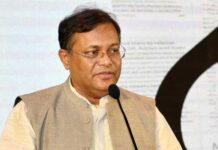China started up its largest hydroelectricity project known as Yarlung Tsangpo in Tibet, on the river Brahmaputra. As Bangladesh has a memorandum with China on Brahmaputra’s water flow, it expects to receive detailed information in this regard from China.
Environmentalists are concerned that the hydroelectricity project constructed upstream will have a detrimental impact on the environments of downstream India and Bangladesh. India has already voiced its objection to the project. China maintains that it is conscious about what impact there will be on neighbouring countries when hydroelectricity is produced by building a dam on shared rivers.
About 65% of Bangladesh’s total river water is from Brahmaputra.
A member of Bangladesh’s Water Resources Ministry, on 26 November, told Prothom Alo, “Brahmaputra used to be marked as the main cause of floods. In February 2006 the Joint Rivers Commission signed an MOU with China for the supply of information regarding the river’s water flow. This came into effect on 15 April. Under this understanding, China is to provide Bangladesh with information regarding Brahmaputra’s water level, the volume of rainfall at the river basin and its flow from the north.”
However, diplomatic sources have said this single memorandum with China concerning rivers is not really effective. Bangladesh government feels that they need information from China about Brahmaputra’s water flow in order to accurately determine weather forecasts.
Bangladesh signed that memorandum with China following a large-scale flood in 2006. According to the World Bank report, Bangladesh faced damages worth $2.2 million, that is, four percent of its GDP.
On 25 November, an assistant minister (of additional secretary rank) of the Chinese Foreign Ministry, and the newly appointed Bangladesh ambassador to China, M Fazlul Karim, held talks on overall bilateral issues of Dhaka and Beijing. However, it is not known whether the issue exchanging information about Brahmaputra featured in these talks.
Source: Prothom Alo









